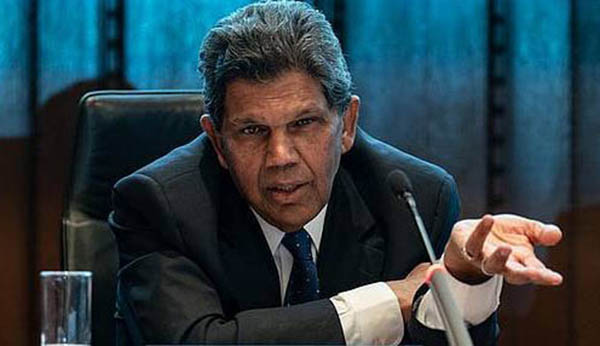By Dr Bertrand Ramcharan
Barrister-at-Law
Author of ‘Modernizing the Role of the International Court of Justice’ (2022)
Over four days between 17 and 22 November, Guyana’s lawyers put up a valiant battle to secure the country’s territorial integrity in the face of arguments by an imaginative group of lawyers for Venezuela. We owe a debt of gratitude to Guyana’s legal team.
The immediate issue was Venezuela’s contention that, although the ICJ had earlier held, in 2020, that it had jurisdiction to pronounce on the validity of the 1899 arbitral award, the case should not be admitted because of the absence of the UK from the proceedings. Guyana’s lawyers argued vehemently that this was an invented issue, without legal foundation.
Guyana’s written Memorial on the Merits of the case, submitted to the Court on 8 March, 2022, and recently released by the Court, summarised the Arbitral Award of 1899 (Ch.3), Venezuela’s acceptance of the award (Ch.4); Venezuela’s subsequent repudiation of the award (Ch.5); and went on to argue that the 1899 award was intended to be final and binding, and is in fact and in law final and binding. Furthermore, Guyana contended in its Memorial, the award enjoys a presumption of legal validity. (Ch.6).
Guyana might have given priority to the argument that Venezuela is legally estopped from challenging the validity of the arbitral award after accepting and implementing it for fully six decades. There is case-law of the ICJ on the issue of legal ‘estoppel’. Had Guyana kept to this legal issue on validity it might conceivably have kept it from having to address a range of factual issues which, in the end result, it chose to do.
Guyana’s written Memorial thus argued that the agreement to arbitrate had been validly concluded; that the Tribunal had been properly constituted (Ch.7); the Arbitral Tribunal had properly exercised its functions and had produced a legally valid award (Ch.8); and that there were legal consequences stemming from Venezuela’s prolonged acceptance of the Award and the Boundary (Ch.9).
Venezuela’s lawyers capitalized on chapters 7 and 8 of Guyana’s Memorial and sought to adduce what they considered detailed and persuasive documentary evidence that the agreement to arbitrate had been imposed on them, that the UK had used fraudulent maps, and that there had been collusion between Britain and the arbitrators, resulting in an unjust, imposed arbitral award. Guyana’s lawyers ridiculed these arguments.
The World Court will now consider and rule on Venezuela’s challenge to the admissibility of the case. If it holds against Venezuela, then it will call upon Venezuela to submit its written Memorial in response to Guyana’s written Memorial. In the unlikely event that the Court upholds Venezuela’s legal objection to the admissibility of the case, then the two countries will need to revert to negotiations, something Guyana’s Agent, Hon. Carl Greenidge pointed out poignantly, had already been tried unsuccessfully for the past half century, effectively stifling Guyana.
In the event that the Court throws out Venezuela’s objections to the admissibility of the case, the two sides were agreed in their legal submissions that there are two issues to be dealt with by the Court: Guyana’s submission, contested by Venezuela, that the 1899 award is valid in law and in fact and legally binding on Venezuela. Guyana’s written Memorial has sought to substantiate this. Venezuela contests this and argues the opposite. The Court will have to weigh the evidence adduced by the two sides.
The second issue concerns the question of settling the definitive border between the two countries. When the Court held, in December, 2020, that it had jurisdiction to hear the case, it was argued in the pages of Stabroek News that the Court had erroneously added the second issue and should have simply kept to the issue of the validity of the 1899 Award. At the time, this interpretation was both challenged and supported by commentators and legal experts.
Guyana’s legal team has now recognized in its legal submissions that there are two issues before the Court one on validity and one on the boundary itself. Guyana’s lawyer, Prof. Sands, stated in his submission to the Court on 22 November, “…the Court is free to exercise its jurisdiction with respect to the second issue over which the Court ruled that it has jurisdiction in its Judgment of 18 December: ‘the related question of the definitive settlement of the land boundary dispute between the Cooperative Republic of Guyana and the Bolivarian Republic of Venezuela.’”
There is an important legal conclusion to be drawn from this recognition that the Court took jurisdiction over two issues, that of the validity of the Arbitral Award, and that concerning the definitive settlement of the land boundary dispute. It needs to be understood that the Court could conceivably go one of two ways when it comes to the question of the definitive settlement of the land boundary dispute: first, the Court could uphold the existing boundary, or conceivably, it could fix another boundary, depending on the evidence it hears on this matter. In his submission, Prof. Sands stated that “…following the Court’s Judgment on jurisdiction,…the Court identified the issues to be decided as the validity of the 1899 Arbitral Award and the related question of the definitive settlement of the land boundary dispute between Guyana and Venezuela…” He added that there would not be: “any impediment to the Court fixing the international boundary exactly where the arbitrators did, in light of Venezuela’s formal agreement to it in 1905, and its scrupulous conformity to that boundary for more than sixty years…” By necessary implication, the Court could fix another boundary, depending on the evidence adduced before it by the two sides.
The die is now cast, and Guyana has taken upon itself the legal burden of proving that the Arbitral Award of 1899 was and remains valid. Venezuela will contest this. Whether it can successfully do so remains to be seen. Guyana’s lawyers think that it cannot.
Depending on whether there is a Merits stage of the proceedings, and whether Venezuela participates in that stage, Venezuela could conceivably advance arguments for a different, or altered boundary and it its conceivable open to the Court to weigh the evidence on this and fix the boundary differently to the present one. Some judges of the Court had already stated in their Individual Opinions in 2020 that the Court may be called upon to fix a boundary.
To conclude, the legal issues now at hand are three-fold: first, will the case go forward or will it end and the parties have to return to negotiations; second there is the issue of the validity of the 1899 arbitral award; and third, there is the issue of settling the boundary, whether this be upholding the existing one, or fixing another one.
Whether there might still be room for Guyana to prioritise the issue of legal estoppel, namely that Venezuela is legally estopped from challenging the 1899 arbitral award after accepting and upholding it for over six decades is a possible fourth legal issue that might be pondered. It could be Guyana’s strongest legal argument.









